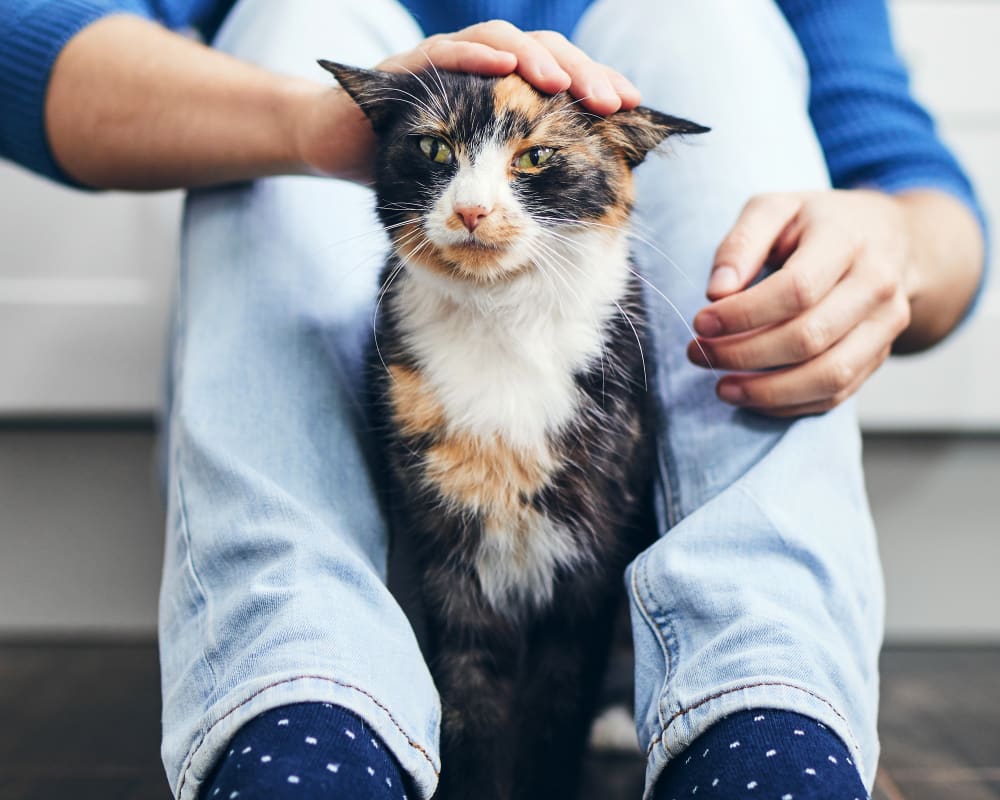Senior Pet Care
Improve Your Senior Pet's Quality of Life
Has your dog or cat begun 'getting up there' in years? Are they starting to slow down compared to when they were young?
As our pets age, they become more susceptible to various health issues like arthritis, dental problems and organ dysfunction. Regular veterinary check-ups can help detect these issues early on and provide timely treatment, preventing further complications.
By investing in veterinary care for your senior pet, you can ensure they receive the necessary preventive medications and treatments to improve their quality of life. This can include specialized diets to manage weight and promote joint health, pain management strategies for arthritis and dental cleanings to prevent gum disease.
Don’t hesitate to contact us to schedule regular check-ups to monitor your senior pet's overall health and address any potential issues.

Health Problems in Senior Pets
Our cherished pets are enjoying increased longevity and living much longer than in the past due to improvements in nutrition and advances in veterinary science.
But this also means pet owners and veterinarians are now faced with the challenge of managing more age-related conditions.
Some of the age-related health problems we commonly see in elderly pets include:
-
Joint or Bone Disorders
Senior Dogs
As your dog ages, they may experience pain and discomfort due to various joint or bone disorders. Our veterinarians commonly see arthritis, hip dysplasia, osteochondrosis, reduction in spinal flexibility and growth plate disorders in senior dogs.
Keeping your dog comfortable as they continue to age requires addressing these issues early. Veterinarians treat joint and bone issues in senior dogs by using analgesics and anti-inflammatory drugs or performing surgery to remove diseased tissue.
Senior Cats
While we typically think of osteoarthritis as a condition that affects older dogs, it can also affect the joints of senior cats, causing them pain.
Cats show more subtle symptoms of osteoarthritis compared to dogs. Senior cats with osteoarthritis commonly exhibit weight loss, loss of appetite, depression, change in general attitude, poor grooming habits, urination or defecation outside the litter box and an inability to jump on and off objects. Cats can also experience a decrease in range of motion.
-
Cancer
The unfortunate reality is that many of our pets will develop cancer in their lifetime. Bringing your senior pet in for routine checkups even when they seem healthy allows your veterinarian to examine your dog or cat for early signs of cancer. Earlier diagnosis typically results in better treatment outcomes.
-
Heart Disease
Senior pets can experience heart disease. Congestive heart failure is a common condition diagnosed in senior dogs.
Cats develop heart disease less often, but that being said, Feline Hypertrophic Cardiomyopathy (HCM) is still common enough that it should be tested for when cats get older.
-
Blindness & Hearing Loss
Older pets, particularly dogs, can experience varying degrees of deafness and blindness due to degeneration in the eyes and ears.
Senior pets often experience a slow onset of these conditions, which allows them to adjust their behaviour and makes it difficult for pet owners to notice.
-
Liver Disease
Elderly cats commonly experience liver disease, which can occur due to high blood pressure or hyperthyroidism. Cats with liver disease exhibit symptoms such as loss of appetite, jaundice, drooling, vomiting, diarrhea and increased thirst.
Dogs can experience symptoms such as seizures, vomiting, diarrhea, fever, jaundice, abdominal fluid buildup and weight loss, which can indicate liver disease.
-
Diabetes
Most dogs and cats develop diabetes when they enter their senior years, although it can occur at any age.
Dogs and cats with diabetes exhibit symptoms such as excessive thirst, weight loss accompanied by increased appetite, cloudy eyes and chronic or recurring infections.
-
Kidney Disease
Kidney function tends to decline as our pets age. However, in some cases, medications used to treat other conditions in senior pets can cause kidney problems.
Although there is no cure for kidney disease, veterinarians can often manage it with a prescription diet and medications.
-
Incontinence
The muscles controlling the bladder weaken in elderly pets, making them prone to accidents. However, incontinence can indicate a bigger health issue too, such as a urinary tract infection or dementia, so it should never be ignored.
Routine Exams & Your Senior Dog or Cat
Regular examinations for senior dogs and cats provide our veterinarians with the opportunity to detect developing issues early. When a health condition is detected in its earlier, more manageable stages, treatment can begin sooner. When conditions such as cancer, diabetes or heart disease are treated early, the progression of the disease can often be slowed or stopped.
Our veterinarians will thoroughly examine your senior dog or cat and ask about their diet and lifestyle. Testing may be recommended to gain additional insight into your pet's overall health.
Next, your veterinarian will recommend a treatment plan to address any existing health problems and help prevent potential age-related issues.
Recommendations may include changes to your dog or cat’s diet or exercise routine, as well as medications to help your senior pet stay happy and comfortable.
New Patients Welcome
Creston Veterinary Hospital is accepting new patients. We are passionate about providing outstanding care to all pets across the Creston Valley. Book an appointment today!
Link to Contact pageLocation
Creston Veterinary HospitalLink to Contact pageHours
-
Click to View
- Monday:09:00 am - 01:00 pm02:00 pm - 05:00 pm
- Tuesday:09:00 am - 01:00 pm02:00 pm - 05:00 pm
- Wednesday:09:00 am - 01:00 pm02:00 pm - 05:00 pm
- Thursday:09:00 am - 01:00 pm02:00 pm - 05:00 pm
- Friday:09:00 am - 01:00 pm02:00 pm - 05:00 pm
- Saturday:Closed
- Sunday:Closed
Please note: We're temporarly closed on Saturday due to renovations.
